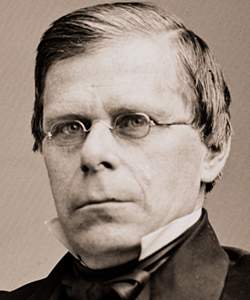Israel Washburn (Congressional Biographical Directory)
Reference
WASHBURN, Israel, Jr., (brother of Elihu Benjamin Washburne, Cadwallader Colden Washburn, and William Drew Washburn), a Representative from Maine; born in Livermore, Androscoggin County, Maine, June 6, 1813; attended the common schools and was educated by private tutors; studied law; was admitted to the bar in 1834 and commenced practice in Orono, Penobscot County, Maine; member of the State house of representatives in 1842 and 1843; unsuccessful candidate for the Thirty-first Congress in 1848; elected as a Whig to the Thirty-second and Thirty-third Congresses, as a Republican to the Thirty-fourth, Thirty-fifth, and Thirty-sixth Congresses and served from March 4, 1851, to January 1, 1861, when he resigned, having been elected Governor; chairman, Committee on Elections (Thirty-fourth Congress); Governor of Maine in 1861 and 1862; declined to be a candidate for renomination; appointed by President Lincoln as collector of customs at Portland, Maine, and served from October 31, 1863, until March 16, 1877, when he resigned; served as president of the board of trustees of Tufts College, Medford, Mass.; engaged in literary pursuits; died in Philadelphia, Pa., on May 12, 1883; interment in Mount Hope Cemetery, Bangor, Maine.
“Washburn, Israel, Jr.,” Biographical Directory of the United States Congress, 1774 to Present, http://bioguide.congress.gov/scripts/biodisplay.pl?index=W000173.
Israel Washburn (National Cyclopaedia)
Reference
WASHBURN, Israel, war governor of Maine, was born at Livermore, Me., June 6, 1813; brother of С. С., С. A., and E. B. Washburn. He was descended from John Washburn, who was secretary of the Plymouth colony in England, and who came to this country in 1861 and settled in Duxbury, Mass His grandfather (Israel) was a revolutionary soldier and member of the Massachusetts legislature; his father (Israel 2d) was born at Raynham, Bristol county, Mass., in 1784, removed to Maine in 1806, became a shipbuilder and trader on the Kennebec river, and settled at Livermore, where he died Sept. 1, 1876, leaving seven sons, most of whom became eminent; three of them being in congress at the same lime. The eldest (Israel 3d) became a lawyer in 1834, opened an office at Orono, Penobscot county, Me., and was sent to the legislature in 1842. He was in congress 1851-60, first as a whig, then as an active republican, governor of Maine 1861-62, collector at Portland, Me., 1863-77. He refused in 1875 the presidency of Tufts college, of which he was long president of the board of trustees. Besides sundry speeches, addresses and contributions to periodicals, be published “Notes, Historical, Descriptive, and Personal, of Livermore, Me.” (1874). He received the degree of LL. D. from Tufts in 1872, and died in Philadelphia, Pa., May 12, 1883.
“Washburn, Israel,” The National Cyclopaedia of American Biography (New York: James T. White & Company, 1894), 5: 400.
Israel Washburn (American National Biography)
Scholarship
Washburn began his congressional career as a champion of Maine interests. He sponsored, for instance, a bill for aid to the European and North American Railway, which, by constructing a railroad from Canadian ports to American railroad lines, would have made Maine a corridor for European immigration. The slavery question, however, quickly propelled Washburn into a national role. Morally opposed to slavery and increasingly convinced that a slave power threatened northern economic progress, Washburn worked hard to prevent the 1852 Whig National Convention from endorsing the Compromise of 1850. In 1854 Washburn helped lead the fight in the House against the Kansas-Nebraska Act. Its passage convinced him that only a new northern party could check slave power aggression. With popular meetings throughout the North condemning the new law, Washburn took action to unite opponents of the Kansas-Nebraska Act into a national coalition. In late May 1854 he called a meeting of approximately thirty antislavery congressmen of all parties and suggested they form a new political organization called the Republican party. Shortly after he had launched the new party among politicians, Washburn publicly called for all northerners to join together as Republicans against the slave power. Washburn was an important congressional Republican leader for the rest of the decade, acting, for instance, as a member of the inner circle that elected Nathaniel P. Banks Speaker of the House in 1856. Quick-tempered and an authority on House rules, Washburn was a sound strategist with rigid integrity and wide influence.
Heather Cox Richardson, "Washburn, Israel, Jr.," American National Biography Online, February 2000, http://www.anb.org/articles/04/04-01037.html.
Israel Washburn, Jr. (New York Times)
Obituary
EX-GOV. ISRAEL WASHBURN, JR.
A private dispatch received in Portland, Me., yesterday, announced the death of ex-Gov. Israel Washburn, Jr., in Philadelphia, to which city he had gone for medical treatment. Ex-Gov. Washburn was born June 6, 1813, at Livermore, (now Androscoggin County,) Me. He received a classical education and then studied law, being admitted to the Bar in October, 1834. Two months later he opened an office Orono, Me., and made that place his home. Having taken an active interest in politics, Mr. Washburn was elected to the Legislature in 1842. From the Legislature he was sent to Washington, where he served in the Thirty-second, Thirty-third, Thirty-fourth, Thirty-fifth, and Thirty-sixth Congress. During his last term he was a member of the Committee on Ways and Means. In 1860 Mr. Washburn was elected Governor of his native State and in 1863 President Lincoln appointed him Collector of the Port at Portland. He had been in Philadelphia since April 20, and was under the care of Dr. D. Weir Mitchell and Dr. John M. Brinton. He was afflicted with pleurisy and inflammation of the lungs, but was not confined to his bed. On Friday he was about the hotel in which he was staying, and spent some time in the office, appearing in excellent spirits. His wife and his youngest brother, William Drew Washburn, were with him when he died.
“Ex-Gov. Israel Washburn, Jr.,” New York Times, May 13, 1883, p. 9: 2.



